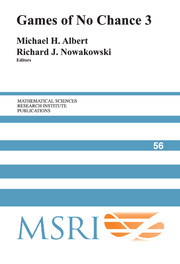Advances in losing
Published online by Cambridge University Press: 28 February 2011
Summary
Abstract. We survey recent developments in the theory of impartial combinatorial games in misere play, focusing on how Sprague–Grundy theory of normal-play impartial games generalizes to misere play via the indistinguishability quotient construction [P2]. This paper is based on a lecture given on 21 June 2005 at the Combinatorial Game Theory Workshop at the Banff International Research Station. It has been extended to include a survey of results on misere games, a list of open problems involving them, and a summary of MisereSolver [AS2005], the excellent Java-language program for misere indistinguishability quotient construction recently developed by Aaron Siegel. Many wild misere games that have long appeared intractable may now lie within the grasp of assiduous losers and their faithful computer assistants, particularly those researchers and computers equipped with MisereSolver.
Introduction
We've spent a lot of time teaching you how to win games by being the last to move. But suppose you are baby-sitting little Jimmy and want, at least occasionally, to make sure you lose? This means that instead of playing the normal play rule in which whoever can't move is the loser, you've switched to misere play rule when he's the winner. Will this make much difference? Not always…
That's the first paragraph from the thirteenth chapter (“Survival in the Lost World”) of Berlekamp, Conway, and Guy's encyclopedic work on combinatorial game theory, Winning Ways for your Mathematical Plays [WW].
- Type
- Chapter
- Information
- Games of No Chance 3 , pp. 57 - 90Publisher: Cambridge University PressPrint publication year: 2009
- 1
- Cited by

